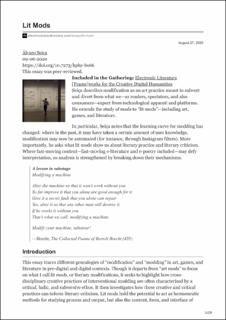| dc.contributor.author | Seiça, Álvaro | |
| dc.date.accessioned | 2021-08-09T11:15:56Z | |
| dc.date.available | 2021-08-09T11:15:56Z | |
| dc.date.created | 2021-04-07T12:26:39Z | |
| dc.date.issued | 2020 | |
| dc.identifier.issn | 1553-1139 | |
| dc.identifier.uri | https://hdl.handle.net/11250/2766996 | |
| dc.description.abstract | Seiça describes modification as an art practice meant to subvert and divert from what we—as readers, spectators, and also consumers—expect from technological apparati and platforms. He extends the study of mods to “lit mods”—including art, games, and literature. In particular, Seiça notes that the learning curve for modding has changed: where in the past, it may have taken a certain amount of user knowledge, modification may now be automated (for instance, through Instagram filters). More importantly, he asks what lit mods show us about literary practice and literary criticism. Where fast-moving content—fast-moving e-literature and e-poetry included—may defy interpretation, so analysis is strengthened by breaking down their mechanisms. | en_US |
| dc.language.iso | eng | en_US |
| dc.relation.uri | http://electronicbookreview.com/essay/lit-mods/ | |
| dc.rights | Attribution-NoDerivatives 4.0 Internasjonal | * |
| dc.rights.uri | http://creativecommons.org/licenses/by-nd/4.0/deed.no | * |
| dc.title | Lit Mods | en_US |
| dc.type | Journal article | en_US |
| dc.type | Peer reviewed | en_US |
| dc.description.version | publishedVersion | en_US |
| cristin.ispublished | true | |
| cristin.fulltext | original | |
| cristin.qualitycode | 1 | |
| dc.identifier.doi | 10.7273/hphy-bs66 | |
| dc.identifier.cristin | 1902690 | |
| dc.source.journal | Electronic Book Review (EBR) | en_US |
| dc.relation.project | EC/H2020/793147 | en_US |
| dc.relation.project | Norges forskningsråd: 294390 | en_US |
| dc.identifier.citation | Electronic Book Review (EBR). 2020 | en_US |

